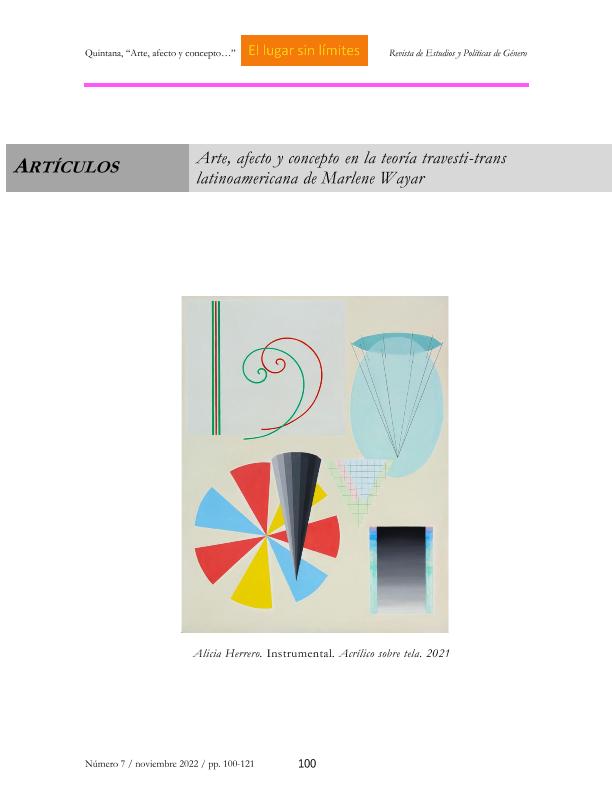Mostrar el registro sencillo del ítem
dc.contributor.author
Quintana, María Marta

dc.date.available
2023-09-28T14:02:53Z
dc.date.issued
2022-11
dc.identifier.citation
Quintana, María Marta; Arte, afecto y concepto en la teoría travesti-trans latinoamericana de Marlene Wayar; Universidad Nacional de Tres de Febrero. Instituto de Investigaciones en Arte y Cultura “Dr. Norberto Griffa”. Centro Interdisciplinario de Estudios y Políticas de Género; El lugar sin límites; 4; 7; 11-2022; 100-121
dc.identifier.issn
2683-9105
dc.identifier.uri
http://hdl.handle.net/11336/213433
dc.description.abstract
En este artículo abordo la teoría travesti de Marlene Wayar según tres vectores o potencias del pensamiento y la experiencia: el concepto, el arte y el afecto. Si bien a los fines de recorrer algunos tópicos los separo analíticamente, considero que es en la intersección de esas tres potencias que dicha teoría adquiere densidad epistemológica, ética y política. Así, busco mostrar que, en lo referido al concepto, la teoría travesti no solo desestabiliza la matriz cis heteropatriarcal, sino que, al reivindicar un “origen” precolombino de la travestidad, somete a crítica la colonialidad del género. En segundo lugar, en lo que concierne al afecto, me interesa analizar un repertorio de sentimientos que dan cuenta de cómo su distribución social desigual regula qué cuerpos (y de qué manera) pueden aparecer en el espacio público; pero también de cómo la teoría y la praxis travestis elaboran una respuesta afectiva-y-epistémica, cuyos motores son la indignación y la rabia. Por último, argumento que el arte, en tanto forma de revisión crítica de las actuaciones guionadas de los géneros hegemónicos, y como proyecto crítico de autoconstrucción corporal, es la dimensión que enlaza y ensambla las potencias conceptuales, perceptuales y afectivas de la teoría y la subjetividad travesti-trans latinoamericana.
dc.description.abstract
In this article, I address Marlene Wayar’s “travesti” theory according to three vectors of thought and experience: concept, art and affect. Although I separate them analytically in order to discuss some topics, I believe that it is at the intersection of these three vectors that the theory acquires epistemological, ethical and political density. Thus, I seek to show that regarding concept, not only does the “travesti” theory destabilize the cis-hetero-patriarchal matrix, but also, by revindicating a pre-Colombian “origin” of “travestidad”, it subjects the coloniality of gender to criticism. Secondly, regarding affect, I am interested in analyzing a repertoire of feelings concerning how its unequal social distribution regulates which bodies may appear in the public space (and how they may do so); but also, how “travesti” theory and praxis develop an affective-and-epistemic response, driven by indignation and anger. Finally, I argue that art, inasmuch as it is a form of critical review of the scripted performances of the hegemonic genders, and as a critical project of bodily selfconstruction, is the dimension that links and assembles the conceptual, perceptual and affective powers of Latin American “travesti-trans” theory and subjectivity
dc.format
application/pdf
dc.language.iso
spa
dc.publisher
Universidad Nacional de Tres de Febrero. Instituto de Investigaciones en Arte y Cultura “Dr. Norberto Griffa”. Centro Interdisciplinario de Estudios y Políticas de Género
dc.rights
info:eu-repo/semantics/openAccess
dc.rights.uri
https://creativecommons.org/licenses/by-nc-sa/2.5/ar/
dc.subject
Epistemología travesti
dc.subject
Colonialidad de género
dc.subject
Agencia afectiva
dc.subject
Corpopolítica travesti
dc.subject.classification
Otras Humanidades

dc.subject.classification
Otras Humanidades

dc.subject.classification
HUMANIDADES

dc.title
Arte, afecto y concepto en la teoría travesti-trans latinoamericana de Marlene Wayar
dc.title
Art, affect and concept in the latin american transvestite-trans theory of Marlene Wayar
dc.type
info:eu-repo/semantics/article
dc.type
info:ar-repo/semantics/artículo
dc.type
info:eu-repo/semantics/publishedVersion
dc.date.updated
2023-07-12T10:24:41Z
dc.journal.volume
4
dc.journal.number
7
dc.journal.pagination
100-121
dc.journal.pais
Argentina

dc.journal.ciudad
Tres de Febrero
dc.description.fil
Fil: Quintana, María Marta. Consejo Nacional de Investigaciones Científicas y Técnicas. Centro Científico Tecnológico Conicet - Patagonia Norte. Instituto de Investigaciones en Diversidad Cultural y Procesos de Cambio. Universidad Nacional de Río Negro. Instituto de Investigaciones en Diversidad Cultural y Procesos de Cambio; Argentina
dc.journal.title
El lugar sin límites
dc.relation.alternativeid
info:eu-repo/semantics/altIdentifier/url/http://revistas.untref.edu.ar/index.php/ellugar/article/view/1407
Archivos asociados
